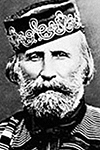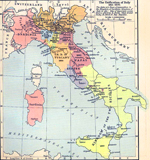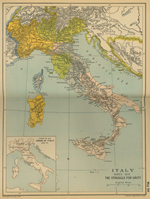|

Giuseppe Garibaldi 1807-1882
Giuseppe Garibaldi was born in Nice, today's France.
Together with
 Giuseppe Mazzini, Giuseppe
Garibaldi was fighting for an Italian republic. His struggles
backfired, the Genoese decided he deserved to die, and Garibaldi
fled direction South America in 1836.
Giuseppe Mazzini, Giuseppe
Garibaldi was fighting for an Italian republic. His struggles
backfired, the Genoese decided he deserved to die, and Garibaldi
fled direction South America in 1836.
While living in exile in South America,
Garibaldi became an
excellent guerrilla warrior. Back in Europe in 1848, and now with
guerrilla know-how in his pocket, Giuseppe Garibaldi became a successful soldier for the
 Risorgimento.
Risorgimento.
Giuseppe Garibaldi's girl was Anna Maria
Ribeiro da Silva, born in 1821. The two had met in Brazil and
Giuseppe made her Anita Garibaldi
in 1842. Anita died in 1849.
With Anita, Giuseppe had a son:
Domenico Menotti Garibaldi.
Domenico Menotti Garibaldi also had a son,
Giuseppe Garibaldi Jr, who fought in the
 Mexican Revolution.
Mexican Revolution.
Back to Garibaldi Sr.
Pressured by an arriving French army,
the Roman Constituent Assembly decreed the surrender of Rome, and of
the Republic, on July 1, 1849.
Garibaldi decided it would be best to pack his knapsack
and get out of town.
On July 2, 1849, a wounded and torn
Garibaldi was at St. Peter's Square in Rome, Anita at his side,
addressing anybody who was willing to continue the fight and
to follow
him.
Here he goes:
Soldati, io esco da Roma. Chi vuole
continuare la guerra contro lo straniero venga con me. Non posso
offrirgli né onori né stipendi; gli offro fame, sete, marcie
forzate, battaglie e morte. Chi ama la patria mi segua.
In other words:
Soldiers, I am going out from Rome.
Let those who wish to continue the war against the stranger,
come with me. I offer neither pay, nor quarters, nor provisions.
I offer hunger, thirst, forced marches, battles, and death.
Let him who loves his country follow me.
According to Garibaldi biographer Giuseppe Guerzoni, the
exact words of Garibaldi's complete speech differ from historian to
historian, and the only phrase we can be sure of is
I offer hunger, thirst, forced
marches, battles, and death.
Good enough for us, and it was good enough for
 Winston
Churchill, who later made this quote the core of one of
his speeches.
Winston
Churchill, who later made this quote the core of one of
his speeches.
Go here to read
 Churchill's
Blood, Toil, Tears, and Sweat speech.
Churchill's
Blood, Toil, Tears, and Sweat speech.
Back to Garibaldi.
The speech showed results and at 8
o'clock that night, Garibaldi left Rome with almost 4,000 soldiers,
800 horses, ammunition, and the basic equipment for a small army.
They arrived at the gates of the Republic of San
Marino on July 29, 1849.
And thus, the Roman Republic existed
from February 5 to July 3, 1849.
On January 24, 1860, Garibaldi married
18-year-old Giuseppina Raimondi, who at the time, and
unbeknown to Garibaldi, was five month pregnant by another man. Garibaldi kicked her out
the second he heard of it, which happened on their wedding day. It
was fine
by her, she didn't like him that much anyway.
Sicily and Naples
In May 1860, Garibaldi invaded Sicily.
On September 7, 1860, Garibaldi captured
Naples, taking it from Francis II, who was the king of the Two Sicilies.
Garibaldi proclaimed himself dictator and acting in the name of
Victor Emmanuel II, the king of Sardinia-Piedmont.
 About the House of Savoy
About the House of Savoy
On October 26, 1860, Victor Emmanuel
entered Naples and was proclaimed King of Italy.
Garibaldi's work here was done, so on
November 8, 1860, he delivered his farewell speech,
 To Arms, All of You.
To Arms, All of You.
And here is the speech in Italian -
 All'Armi Tutti !
All'Armi Tutti !
A united Kingdom of Italy was
officially established on March 17, 1861.
See also
 Governments of Italy.
Governments of Italy.
And here are the maps:

Italy
1815-1870

Italy 1815
More History
|